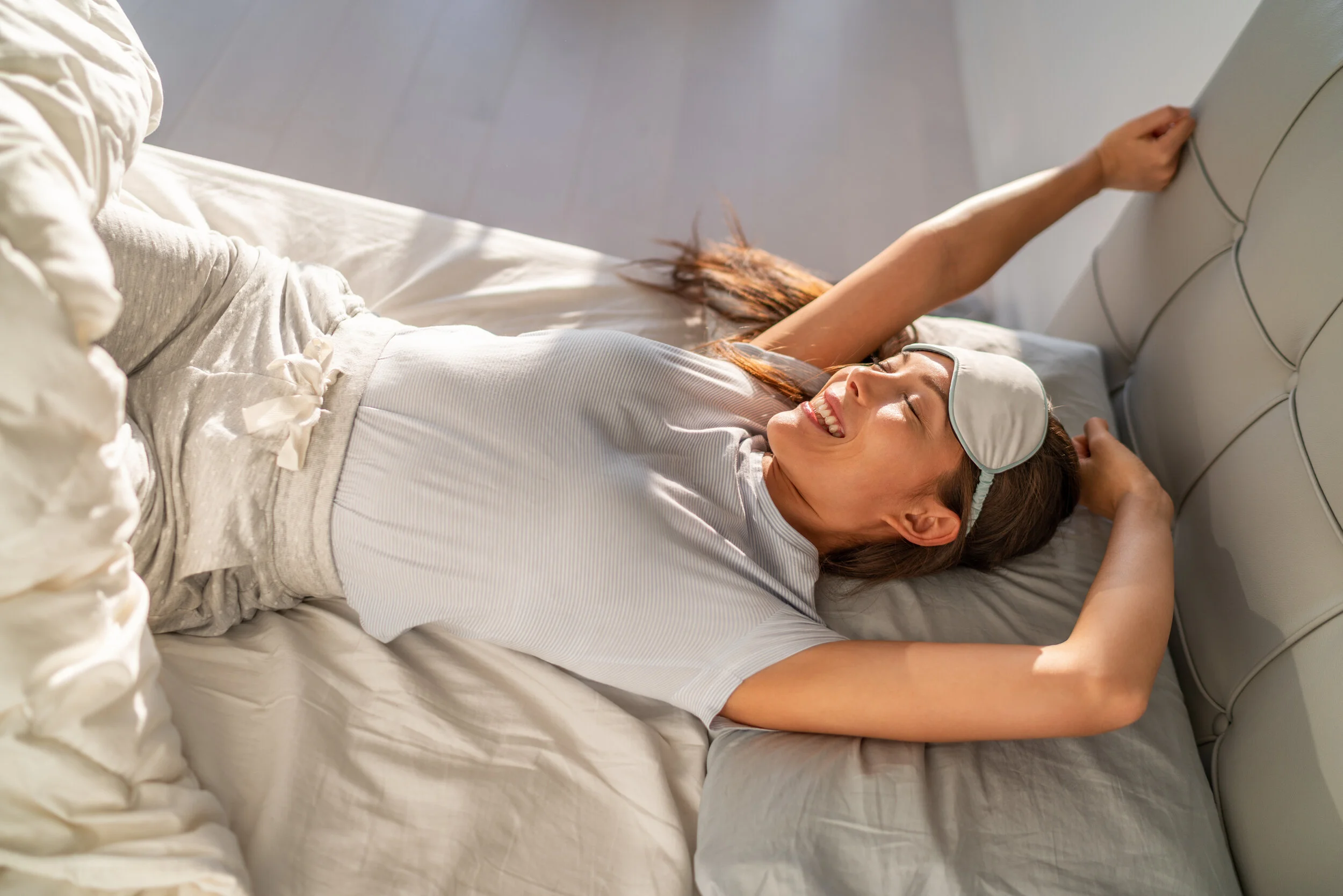Let me clue you in on a little secret…
Your body is designed to sleep well at night.
I know it may not seem like it if you're having sleep issues. But if everything is working properly, then our circadian rhythm — which is the ebb and flow of the hormones melatonin (sleepy hormone) and cortisol (alert hormone) — should work in such a way that we are most alert during the day and sleepy at night.
Our bodies are so smart! Our bodies know when it's night time based on the external cues from our environment. Those cues are: light and darkness and temperature.
Environmental Cues
Light + Darkness
I've talked about light and darkness and how it influences our sleep in the past, but here’s a quick summary for context:
Our eyes have little neurons inside them that collect data from the sun. When those neurons are exposed to light, they tell our body to produce cortisol. Likewise, when there's an absence of light, it tells our body to suppress cortisol and produce melatonin.
How light impacts your sleep probably isn’t news to you. But how temperature impacts your sleep may be…
Temperature
It has a huge impact on our ability to sleep. Our normal core temperature during the day is somewhere around 98.6° F, give or take, and depending on the individual. At this normal, daily core temperature, our body is producing cortisol at its normal, daily rate. Our body temperature slowly rises and peaks about midday, and then slowly declines again, lowering at night as we enter sleep. This lowering of our body temperature sends a signal to our brain to produce melatonin and suppress cortisol.
Our core body temperature actually has to lower by 2° F in order to fall and stay asleep. Interestingly enough, our core body temperature very gradually declines throughout the night and reaches its low about 90 minutes before wakeup. It makes sense from a biological standpoint, because if you think about our ancestors sleeping outside, their body temperature would naturally lower as the sun sets, and the ambient temperature would increase as the sun rises, waking them back up. How smart is that?
This explains why many people wake up in the middle of the night due to overheating. Overheating sends a signal to the body to suppress melatonin and produce cortisol. This is especially true for women of a certain age, going through perimenopause (hello!) or post-menopause.
Research
Of course, I would never tell you to focus on something if it wasn’t fully backed by research. There is plenty of research to show that core temperature matters when it comes to sleep. One study in particular showed that individuals with higher body temperatures spent less time in slow wave restorative sleep.
Another study showed that individuals who had a greater differential between their core temperature and the temperature of their extremities (meaning their body isn't doing a good job of cooling down its core), had lower sleep efficiency and were more prone to wake-ups.
A study in 2012 showed that room temperature was one of the most important factors when it comes to getting a good night's sleep. You may be wondering what the ideal room temperature for sleep is, and I’m going to talk more about that in a moment. But for quick reference: the ideal room temperature for sleep is 65° F.
Lastly, there was another study of 700,000 individuals that showed that people typically slept more poorly in the summer months.
How to Achieve Optimum Temperature for Your Sleep
The ideal room temperature for sleep is 65° F. However, it varies per individual. Most doctors recommend keeping your thermostat somewhere between 60-68° F.
If you're somebody who runs hot and wakes up in the middle of the night sweating, don't worry — you are not doomed to have poor quality sleep! There's plenty that you can do to help support your body's thermoregulation.
Here are some tips:
1
Invest in a tabletop thermometer
Ambient temperature can vary greatly from what your thermostat reads, and you want to ensure you’re reaching somewhere around 65° F.
Tabletop thermometers are inexpensive and go a long way in helping to monitor room temperature. With one, you’ll know exactly what temperature your room is and how to adjust for better sleep.
2
Schedule your thermostat
If you have the option, schedule your thermostat so that it lowers to the optimal temperature by bedtime. This way, you take the guesswork out of adjusting the ambient temperature every time — and you can focus, instead, on relaxing into sleep.
3
Take a bath or a warm shower
This is a proven technique to reduce your core body temperature.
Here’s how it works:
The warm water heats up your body
As soon as you get out, blood rushes to the surface of your skin, away from your core
Your core temperature effectively cools down
4
Improve air circulation
Run an overhead fan, use a box fan or a podium fan, and/or crack your window. This will ensure there is air circulation in the room and keep the air from getting stagnant and hot.
5
Sleep in natural fibers
You also want to make sure you're sleeping in natural fibers because natural fibers are very good at temperature regulation. They're insulating, but they're also breathable and wick moisture. The fibers that I look for are linen, wool, organic cotton, and tencel.
Sheets
When it comes to your sheets, I would choose linen or organic cotton. I really like organic products for sleep, because let's face it, we spend 1/3 of our life sleeping and we want to make sure we're not exposed to harmful toxins when we're sleeping.
Mattress
When it comes to your mattress, look for a mattress that is stuffed with wool. I really love Avocado mattresses because they are made of wool and also organic cotton.
Wool
You can take it a step further by sleeping sandwiched in wool. You can buy a mattress topper made of wool, and a duvet made of wool. Like I said before, that material is really good at temperature regulation, and research actually shows that if you sleep sandwiched in between wool, it improves your sleep by 25%. That’s definitely significant and not a number to be dismissed.
Since investing in a wool mattress topper and duvet cover, my husband and I have noticed a significant difference in our sleep. My husband used to wake up every night sweating and this hasn’t happened since we made the change. The product that we purchased is from a company called You Are What You Sleep and I highly recommend them.
Pro Tip: Use the code 15 OFF for 15% off your order from You Are What You Sleep!
Let’s get you tucked in
Is your linen closet full of every material you’ve tried on the planet to get to sleep — and it’s still not helping? There may be something more going on behind the scenes. In cases like these, I highly recommend functional lab testing to look at your hormones, gut health, thyroid, mineral deficiencies, and food sensitivities. I offer lab testing as part of my adult sleep coaching, so if this seems like something you want to look into, let’s talk. Give me a call and let’s get you sleeping again →
For more tips, you can read more articles on improving your sleep in my sleep blog. I have a ton of great resources.
My mission is to help you get the rest you deserve to be your best.
Sweet Dreams
Kelly Murray is a certified sleep coach and an award-winning pediatric sleep consultant based in Chicago offering sleep coaching services nationwide.




